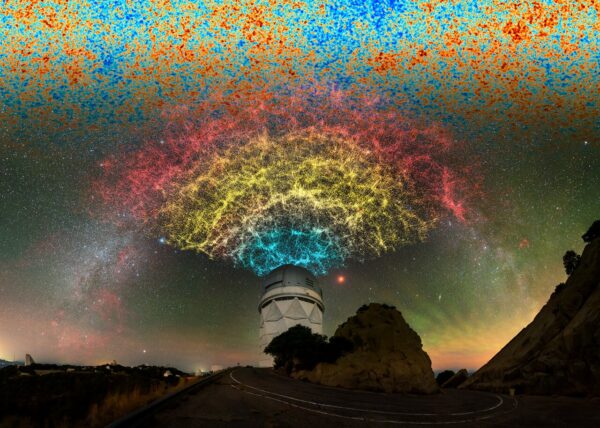Joan Najita (NOIRLab) and Luke Tyas (LBL)
Science communicators across the internet are discussing DESI’s Year 1 results and their implications for the fate of the Universe. Here are some of the highlights.

DESI Collaboration/KPNO/NOIRLab/NSF/AURA/P. Horálek/R. Proctor
World Science Festival: Is Dark Energy Decaying?
Brian Greene sits down with Michael Levi (LBL) to discuss DESI’s revolutionary observations that may upend our understanding of the cosmos. In an hour-long conversation that takes us from the discovery of dark energy to the birth of the DESI project and on to its Year 1 Key Project results, Greene and Levi highlight the cutting-edge nature of the story. That is, we’re finding an intriguing hint that dark energy is weakening (i.e., becoming “less pushy” over time), and but we’re not completely sure. Commenting on the uncertainty, and how we’ll know more soon, “This is why I love doing physics,” says Levi, “It’s detective novel that you get to read and discover, and it was written by the Universe!” As for the bigger picture meaning of the results, should they hold up, the weakening accelerated expansion of the universe seems reminiscent of the end of the inflationary expansion phase that marked the birth of the Universe. Levi finds it “appealing that we may be living in an epoch that ties back to the beginning of time.”
PBS Nova: New Map of the Universe Hints that Dark Energy May Be Evolving
This 3-minute video, which includes commentary from David Kaiser (MIT) and Priya Natarajan (Yale), describes how the DESI results could “fundamentally change what we know about the Universe and how it may come to an end.” Kaiser says the new DESI map of the Universe is more than a simple accounting where stuff is at any given moment. It also captures the Universe’s dynamics, creating something more like a movie that shows how fast space was stretching at different times over the Universe’s history. Natarajan emphasizes the possible cosmological implications of the results, noting that “If dark energy was a constant, the fate of the Universe would be grim.” Instead The DESI results appear to “open the door to the possibility of changing dark energy models”, which for Natarajan, “means that we have more exciting (possible) fates that await us.”
NPR: This week in science: Pompeiian frescoes, dark energy and the largest marine reptile — NPR’s Mary Louise Kelly talks with Emily Kwong and Rachel Carson of Short Wave about how dark energy may be changing, with commentary from Priya Natarajan (Yale).
Dr Becky: Does the expansion rate of the Universe CHANGE over time?! DESI 1 year results — In this 12-minute video, astrophysicist Dr Becky Smethurst (Oxford) explains Baryon Acoustic Oscillations in words normal people can understand and walks the listener through the main plots and results from the Year 1 Key Project papers and press release.
Anton Petrov: Strange Expansion of the Universe Results from the Most Accurate Map — With a phenomenal 268,000 views as of this writing, this 12-minute video from scientist and educator Anton Petrov describes the use of Baryonic Acoustic Oscillations as a cosmological standard ruler and the implications of the DESI results for our understanding of what the universe “was doing billions of years ago, what it’s going to be doing in the future, and how all of this ends.”
AM24:First Year Results from the Dark Energy Spectroscopic Instrument (DESI) — Three talks by DESI scientists at the April 2024 meeting of the American Physical Society unveil DESI’s cutting-edge results. First, Hee-Jong Seo (Ohio University) presents the BAO results from galaxies and quasars at z < 2. Next, Julien Guy (Berkeley Lab) presents BAO results from the Lyman-alpha forest at z > 2. Finally, Mustapha Ishak (UT Dallas) presents the cosmology implications of the measurements.